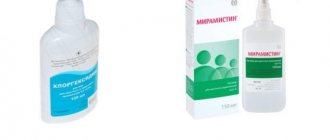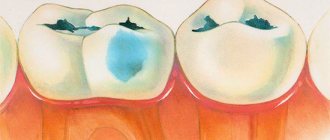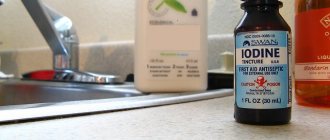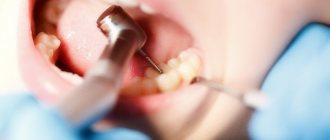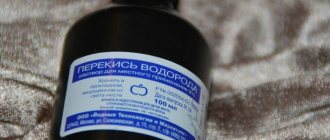Bad breath in a child
Bad breath from a baby can occur for a variety of reasons, from stress to diseases of the digestive system. Most often, halitosis in children occurs due to untimely brushing of teeth, excessive dryness in the mouth and nose; it goes away after cleansing and moisturizing. If your child constantly has bad breath, you should immediately consult a doctor. Osostomia (as doctors call halitosis) may be the first sign of a serious illness; parents should not take this symptom lightly. It is advisable to consult a dentist to check the condition of the baby’s teeth and gums. If the unpleasant symptom does not disappear, consult a pediatrician, do a general blood test, and depending on its results, consult a specialist.
Bad breath in a child can indicate many diseases.
In what cases is it necessary to visit a specialist?
When a child's mouth smells sour, this does not always indicate the presence of diseases. If you have a sour breath that is accompanied by other symptoms, you should consult a doctor, as this may indicate the development of possible stomach diseases. In particular, the following symptoms may indicate disturbances in the functioning of the gastrointestinal tract:
- pain in the stomach or intestines;
- nausea or vomiting;
- belching;
- increased flatulence;
- difficulties with bowel movements;
- intestinal disorders.
Contacting a pediatrician is mandatory. Since only a doctor after examination can determine the cause and prescribe additional examinations and treatment. You may just need to adjust your diet. If a smell occurs after drinking formula or breast milk, this is normal. If necessary, the pediatrician will refer the child for a consultation with a dentist or gastroenterologist.
We suggest you familiarize yourself with tablets that are the best remedy for toothache.
Specific pungent odor
Parents should be alarmed by the specific smell from the baby’s mouth, which does not go away after hygiene procedures. Limit your baby's consumption of sweets and heavy protein foods, and ensure he drinks plenty of fluids. Usually, after these events, children's halitosis goes away.
Below we will tell you which smells should cause an instant reaction from parents.
Acetone (acetic, solvent)
The smell of acetone or a chemical solvent emanating from a baby, especially against a background of elevated temperature, should cause maximum concern for parents. It appears in acetonemic syndrome, a dangerous condition that is quite common in children of all ages. If you suspect its occurrence, you must immediately call an ambulance, before the doctors arrive, and give the baby boiled water often and in small quantities (a teaspoon).
A slight acetone smell can be a sign of kidney disease, malfunction of the pancreas, helminthiasis (worms), dysbacteriosis, and diabetes. In any case, it is advisable to consult a doctor immediately.
Putrefactive
Appears with insufficient oral hygiene, the occurrence of ENT diseases (sore throat, pharyngitis, tonsillitis, in parallel, the child has a white tongue, a stuffy nose, a cough), stomatitis, caries, low acidity of the stomach (the baby often has a stomach ache), the presence of diseases of the esophagus . You should consult a dentist, ENT specialist, gastroenterologist, systematically brush your teeth with a children's toothbrush and toothpaste, and ensure drinking regime.
Purulent
A pungent purulent odor accompanies chronic inflammation and proliferation of lymphoid tissue in the baby’s nasopharynx. The tonsils become covered with purulent plaque, plugs form, emitting an unpleasant odor. The child has a high fever, a sore throat, a runny nose, and a coated tongue. Contact your pediatrician; antibiotic treatment may be necessary. After recovery, your breath will become fresh again.
Another reason for bad breath against the background of copious discharge of dense yellowish snot can be the presence of some object in the baby’s nostril. Contact your ENT specialist to examine your baby's nose.
Sourish
If your baby has a sour breath, this may indicate increased acidity and an inflammatory process in the stomach. It is necessary to contact a gastroenterologist and check the baby for the presence of gastritis. The second cause of bad breath is reflux, or the entry of gastric juice into the baby’s esophagus. In this case, the patient suffers from heartburn and pain in the hypochondrium.
Sweetish
Does the baby have a cloying sweet aroma from the mouth? There is reason to suspect liver problems. It is important to promptly visit a gastroenterologist - the symptom occurs with hepatitis or cirrhosis of the liver.
Chemical
If your toddler smells of chemicals, it is advisable to check the condition of the digestive organs, especially the gallbladder; this symptom is characteristic of biliary dyskinesia.
Chlorine
The specific smell of chlorine mixed with metallic notes appears with increased bleeding gums and periodontal disease. Contact your dentist and check the condition of your baby's teeth and gums.
Yoda
The appearance of the smell of iodine is a reason to urgently contact an endocrinologist, as it may indicate an excess of iodine that accumulates in the baby’s body. This condition can occur after a long stay at sea, after taking iodine preparations, or in the presence of thyroid pathology. In infants, an iodine tint appears when infected with Klebsiella, a bacterium that enters the child's body with unwashed fruit and affects the stomach and intestines.
Bile
If a newborn's breath smells like bile, this may indicate poor bile flow. Consult a doctor, do an ultrasound of the abdominal organs, and take general tests.
Gland
The presence of a metallic taste and iron smell from the baby's mouth may indicate the occurrence of iron deficiency anemia. You should take a blood test to determine your hemoglobin level, and if the diagnosis is confirmed, take vitamin complexes with a high iron content.
The second reason is the presence of gastritis, high acidity, dysbiosis, and diseases of the gastrointestinal tract.
Urine
An ammonia smell indicates kidney pathologies, as well as diabetes. The reason for its appearance is a decrease in insulin levels and impaired carbohydrate metabolism.
Kala
It is extremely rare. It is mainly associated with poor heredity, appears with metabolic disorders, and sometimes accompanies acute intestinal dysbiosis. Diagnosed by an endocrinologist or gastroenterologist.
Rotten eggs
Belching, the smell of rotten eggs, and a white coating on the tongue are symptoms of gastritis, ulcers, liver disease, and impaired bile flow. If you find halitosis in a newborn or older child, you should contact a gastroenterologist.
Yeast
If a baby smells of yeast, this is a reason to suspect candidiasis. Often a sick stomach is also expressed by a yeasty aroma. An experienced general practitioner will be able to recognize the true cause, and he will also refer you for examination if gastrointestinal diseases are suspected.
Causes of unpleasant odor
The human body does not have a distinct odor. A persistent unpleasant odor appears in case of increased activity of the sweat glands, infectious diseases or non-compliance with hygiene rules.
If a child has a sour smell of sweat, then the baby should be examined for any diseases. Most often this is associated with diseases of the internal organs.
Sour sweat may be a reason to suspect one of the following diseases:
- The presence of a virus or infection in the body. In this case, in addition to the bad smell, the child will be overcome by signs of a cold. He will have a high temperature, cough, and runny nose. During a fever, your baby will naturally sweat.
- Heart failure. In addition to sour sweat, the child is often in a bad mood, he cries and gets tired quickly. This is an indicator that the baby should be shown to a cardiologist.
- Lack of vitamin D. Rickets has a number of signs by which it can be diagnosed. The baby is lagging behind in mental and physical development. He experiences baldness on the top of his head, gets tired quickly and is often prone to apathy.
- Tuberculosis. If, along with a sour smell, a child suffers from a cough for a long time, then parents should not delay visiting a doctor. The cause may be lung disease.
- Hyperfunction of the thyroid gland. Failure of this organ leads to hormonal imbalance. With this disease, a sharp sour odor of sweat appears in the child. Additional symptoms are increased irritability, a tendency to tearfulness and excess weight.
- Diseases of the gastrointestinal tract. The cause of a very unpleasant odor may be pancreatic dysfunction. The disease usually develops against the background of elevated blood sugar levels. Greater fatigue and extreme thirst are considered indicators of this problem.
- Diseases of the nervous system. The baby is often and noticeably nervous, his hands are shaking, and there is trembling in his knees. A child's sweat smells sour, often the smell is very pungent and unpleasant even at rest.
- Helminthiasis. Often helminths are the source of a child’s not-so-good odor. Their presence causes sleep disturbances in children, they become irritable. Constipation may be replaced by diarrhea, skin rashes, nausea, and in severe cases, vomiting. Against the background of such manifestations, the baby refuses to eat and is capricious. Infection with parasites contributes to intoxication of the entire body. Constant disorders of the digestive system cause an increase in temperature. Such symptoms cannot be ignored.
- Vitamin B12 deficiency. Lack of this microelement leads to pernicious anemia. This is a very serious and life-threatening disease.
- Diabetes. An increase in blood sugar can trigger a condition where the child has sour sweat.
If the child is healthy, then he sweats only under certain conditions, for example, when it is hot or after active physical activity. There are no strong aromas. But if a child’s sweat smells sour, it is recommended to show it to a doctor.
Causes of halitosis in children
The appearance of halitosis in children of any age can be caused by a variety of reasons, ranging from insufficient oral hygiene to the presence of a foreign body in the nose. It is important to correctly diagnose, determine the true cause of osostomy and, if possible, eliminate it.
Lack of moisture in the body
Causes increased viscosity of saliva, poor digestion, which can cause bad breath. An infant newborn receives the main liquid from mother's milk; in hot weather it is necessary to give boiled water to drink. A 4-5 year old child should drink approximately 1.5 liters of liquid per day, not limited to juices and teas. It is important to give your toddler drinking water, which helps improve digestion.
Poor oral hygiene
With the appearance of the first tooth, the baby should be accustomed to oral hygiene procedures. Children under two or three years old should have their teeth brushed by one of their parents. From the age of three, children should be taught to brush their teeth correctly on their own. Improper and insufficient cleaning of plaque contributes to the appearance of halitosis, which resolves after thorough brushing of the teeth.
Poor nutrition
If a child systematically overeats, eats fatty fried foods generously seasoned with onions and garlic, a heavy odor from the mouth will haunt him constantly. It is important to adjust the baby’s nutritional system according to his age needs, observing the drinking regime.
Stressful situation
Strong emotional shock, stress, and vivid emotions are a real test for a newborn. They cause dry mouth, which contributes to halitosis. In a stressful situation, you need to give the child a drink of water or sour juice, suck a slice of tangerine or lemon; such simple steps promote active salivation and make the child’s breathing clean and easy.
Unpleasant smell in the morning
Babies may experience bad breath after sleep. It is caused by the fact that saliva is not released at night during sleep, bacteria multiply, causing halitosis. It is enough to brush your teeth with a brush and toothpaste - and the unpleasant phenomenon disappears on its own.
Chronic nasal congestion
If your baby's mouth smells like snot, you need to pay attention to the condition of the mucous membrane of the nose. With chronic rhinitis, nasal breathing is difficult, and dry crusts form in the nasal passages. It is necessary to moisturize the surface of the mucous membrane, monitor humidity, ventilate the room well and carry out wet cleaning.
Presence of a foreign body in the nasal passages
A strong putrid odor accompanied by thick yellow discharge from the nasal passages should alert you. These symptoms are characteristic of a foreign object entering the nasal passages - beads, buttons, a piece of fruit. You should consult a doctor or emergency room as soon as possible to remove the foreign body. Otherwise, serious complications are possible, including suffocation.
Diseases of teeth and gums
Caries, stomatitis, gingivitis and other dental diseases can cause bad breath. A careful examination will reveal a carious lesion in the baby’s mouth. Even if there is no visible damage to the tooth enamel, it is necessary to consult a dentist to rule out the presence of oral diseases.
Upper respiratory tract diseases
Sore throat, tonsillitis, adenoiditis, bronchitis provoke the occurrence of halitosis in children. The pus that accumulates on the surface of the tonsils, in the lacunae, on the back wall of the throat has an unpleasant smell. The cause of the disease should be treated, rinse with an antiseptic solution, and in difficult cases, antibiotic therapy is necessary.
Diseases of the gastrointestinal tract
When a little person’s mouth smells like solvent, sour milk, vinegar, and there is an upset stomach and diarrhea, this indicates problems with the gastrointestinal tract. Consult a gastroenterologist; sometimes it is enough to adjust the baby’s diet, and the problem disappears without a trace. In more complex cases, special treatment is indicated.
Teething odor
When a baby is teething, temporary halitosis may occur, caused by inflammation of the gums and the proliferation of pathogenic bacteria. The baby's gums are red, painful and swollen. The dentist will recommend special medications that reduce the baby’s discomfort during teething.
Treatment of unpleasant odor
In most cases, osostomy does not require special treatment. It is enough to systematically thoroughly brush your teeth and gums, review your diet, limit your consumption of sweets, give him enough liquid per day, and the unpleasant symptom will disappear on its own. If after a few days it does not disappear, you need to consult a specialist, undergo an examination and determine the cause of halitosis.
Parents should be especially concerned about the smell of acetone emanating from the baby - in this case, it is necessary to urgently call an ambulance or take the baby to the hospital to prevent the occurrence of acetone syndrome.
Preventive measures
To promptly prevent the appearance of halitosis in your baby, you must follow a few simple rules:
- Brush your baby's teeth thoroughly twice a day, starting when the first tooth emerges. It is necessary to teach your child how to use a brush and toothpaste correctly to remove plaque from the surface of the teeth.
- Adhere to the age-specific nutrition system, introduce vegetables, fruits, and foods rich in phosphorus and calcium into your child’s diet.
- Eliminate sugar, chocolate, and other sweets from your diet and replace them with honey.
- Give your child plenty of fluids, especially drinking water.
- Visit your dentist regularly to prevent the development of caries.
Source: TopDent.ru
Causes and elimination of sour breath in a child under 1 year old
In infants, the digestive system is not yet fully formed, and the basis of their diet is milk, therefore, in children under the age of 1 year, a slight pleasant milky smell from the mouth is considered normal.
If the smell begins to be stronger and the odor becomes unpleasant, this may indicate that the baby has increased acidity or has reflux. These are far from the only reasons for the appearance of an unpleasant odor in children, so you should definitely show the child to the doctors.
If your baby is breastfed
The most common smell is sour in infants. The diet of children of this age usually consists of breast milk. An infant's imperfect digestive system can sometimes provoke the appearance of a foul, sour odor. This can occur after regurgitation and belching. Sometimes such a smell can appear in the morning, but this is already a feature of the human body. If the baby’s sour breath does not go away, then you should absolutely not ignore this problem. The child should be examined immediately to find the cause of bad breath.
The microflora consists of both “good” and “bad” bacteria. There are much more “good” microorganisms than “bad” ones, and when this balance is disturbed and the “bad” ones begin to dominate, then an unpleasant odor appears. The proliferation of pathogenic bacteria can be caused by the following reasons:
- weakness of the immune system;
- a consequence of hypothermia;
- fasting;
- overeating;
- overwork and fatigue;
- Acute respiratory infections and colds.
Lactic (“good”) bacteria begin to actively fight for survival, as a result of which the breath becomes stale, with a pronounced sourness. The pleasant and unique smell of an infant can be spoiled by a pungent odor from his mouth, which can be caused by:
- In infants, the digestive system is not yet fully formed, and the basis of their diet is milk, therefore, in children under the age of 1 year, a slight pleasant milky smell from the mouth is considered normal.
If the smell begins to be stronger and the odor becomes unpleasant, this may indicate that the baby has increased acidity or has reflux. These are far from the only reasons for the appearance of an unpleasant odor in children, so you should definitely show the child to the doctors.If your baby is breastfed
The most common smell is sour in infants. The diet of children of this age usually consists of breast milk. An infant's imperfect digestive system can sometimes provoke the appearance of a foul, sour odor. This can occur after regurgitation and belching. Sometimes such a smell can appear in the morning, but this is already a feature of the human body. If the baby’s sour breath does not go away, then you should absolutely not ignore this problem. The child should be examined immediately to find the cause of bad breath.
The microflora consists of both “good” and “bad” bacteria. There are much more “good” microorganisms than “bad” ones, and when this balance is disturbed and the “bad” ones begin to dominate, then an unpleasant odor appears. The proliferation of pathogenic bacteria can be caused by the following reasons:
- weakness of the immune system;
- fasting;
- overeating;
- overwork and fatigue;
- Acute respiratory infections and colds.
a consequence of hypothermia;
Lactic (“good”) bacteria begin to actively fight for survival, as a result of which the breath becomes stale, with a pronounced sourness. The pleasant and unique smell of an infant can be spoiled by a pungent odor from his mouth, which can be caused by:
- improper nutrition of the mother (when a nursing mother eats forbidden foods or strongly smelling foods, this can negatively affect the smell from the baby’s mouth);
- nasal congestion and difficulty breathing;
- dysbacteriosis;
- dry mucous membranes in the baby's mouth.
All these reasons can be easily eliminated; you just need to adjust the mother’s diet, rinse and moisten the nose, give the child something to drink, and the smell will go away. In case of dysbacteriosis or other diseases, you should contact your pediatrician, who will refer the child to specialized specialists.
If the baby is “artificial”
Babies who are deprived of mother's milk and are fed with special formulas may have problems with bad breath due to a lack of fluid in the small body or problems with the ENT organs. Often the cause of a sour smell is a runny nose and inflammatory processes in the maxillary sinuses (sinusitis). Bad breath can also be caused by sour food leftovers in a child's mouth if parents do not properly maintain oral hygiene.
“Artificial babies,” just like those babies who are breast-fed, often spit up, especially in the first months of their life. It can also cause bad breath. It is important to ensure that the child receives the required amount of formula and does not overeat.
How to mask bad breath if you can’t eliminate it completely
One of the causes of bad breath is taking medications. The aroma will accompany the child until the medication is stopped, becoming stronger with each dose received. Or, a more frequent case, is when the baby eats something odorous (fresh onions), and you need to take the child to classes or on a visit. How to mask or eliminate an unpleasant odor:
- Brush your teeth, gums and tongue with a mint or pine aroma paste, rinse your mouth with an alcohol-free mouthwash.
- Hold it in your mouth and chew another product with a strong but pleasant odor. For example, mint or lemon balm (possibly dried), citrus fruit zest.
- Rinse your mouth with a decoction of herbs. They remove odors well: oak bark, mint, chamomile, lemon balm, rose hips.
- Give your teenager a coffee bean or a piece of ginger. Coffee absorbs foreign odors.
- Use an alcohol-free refreshing spray or sugar-free chewing gum.
We invite you to familiarize yourself with Lips Stick. Why lips dry and crack and how to get rid of it forever
Don't mask the smell unless you know the reason. Perhaps this is the only sign of a hidden disease.
Your baby's scent is light and delicate. With proper care, it will remain pleasant for many years. Compliance with the rules of hygiene, daily routine and nutrition and timely contact with a pediatrician is the key to good health for children. Take care of him.
Mothers constantly monitor the health of their children. When a special smell appears from the mouth, they begin to look for the cause of this pathology. Bad breath is caused by various reasons, the main one of which is irregular oral care. However, in some cases, the symptoms that appear may indicate serious problems with the baby’s health and the need to visit a pediatrician. Why does my 2 year old child have bad breath?
Poor hygiene as a factor in bad oral odor
Every person is taught from early childhood that the morning should begin with brushing your teeth and rinsing your mouth. Daily hygiene helps keep your teeth healthy and your breath smelling fresh and pleasant. You can teach your child to take this procedure seriously if you start teaching him from infancy.
If you do not keep your children's mouth clean, leftover food in the mouth creates an ideal environment for the growth and reproduction of pathogenic microorganisms. It is necessary to observe the rules of hygiene from birth, even for those children who do not yet have teeth. For this purpose, special silicone brushes have been developed, specifically designed for these purposes. If such a device is not at hand, after each feeding you should give the baby a drink of clean water, which will wash away the remaining milk or formula.
From the moment the first tooth erupts, the child’s oral hygiene becomes even more thorough, since we are talking about the state of dental health. It is a mistake to believe that if baby teeth are damaged by caries, they will fall out, and the molars will be healthy. Everything in the body is interconnected, and it is the condition of the baby teeth that determines how healthy the permanent teeth will be.
How to get rid of bad breath?
If the “aroma” is the result of a disease, follow the doctor’s instructions. Be sure to follow the prescribed procedures and undergo the prescribed additional examination. When the root cause is eliminated, the smell goes away. What to do if the child is healthy, but the smell is still present? The well-known doctor Komarovsky in Russia gives recommendations:
- The baby's mucous membranes should be moist - this is the main principle in protecting against viruses and microbes that infect the nasopharynx. If the air at home is dry, you will need to ventilate it more often and install a humidifier. Let it work even at night, because during sleep the walls of the nasopharynx dry out. In the absence of a humidifier - place basins with water, hang wet towels - choose any way to achieve humidity of at least 50%. Humidity indicator - dry crusts in the nose; if they are present, hydration is required.
- Maintain a plentiful drinking regime; the child’s body constantly needs clean drinking water. This is especially important during illness. If a preschooler does not drink water well, you should come up with games with drinking water, get a beautiful mug or sippy cup, and teach him to pour water on his own. Liquid removes toxins and breakdown products, it is important to drink a lot.
- Keep your mouth clean. You need to start hygiene from the first days of life. The baby's gums and tongue are wiped with a cotton swab; with the appearance of the first tooth, use a soft brush. You need to clean your teeth and tongue twice a day using toothpaste, rinsing after each meal.
- The baby's diet should remain varied, including cereals, vegetables, fruits, fermented milk products (in the absence of individual contraindications), some meat, fish and other protein foods. Reduce your intake of sugar and sugar-containing foods. Replace with fruits, candied fruits, dried fruits, marshmallows. Start the first complementary foods with vegetables; do not rush to introduce meat into the diet. If your breath smells bad after eating food, it is better not to give such food for now. Avoid carbonated drinks and packaged juices.
- It is acceptable to give your child water acidified with lemon to stimulate salivation. If the baby doesn’t like the water, in the future it’s enough to show the lemon, saliva will come out automatically. Offer sour fruits, they are useful for maintaining the microflora of the oral cavity and intestines.
- Daily walks are required. If the child walks for 2-4 hours every day in good weather, this will strengthen the immune system. The body will begin to cope more successfully with germs and bacteria.
- Get regular check-ups with your pediatrician and dentist on time, even if there is no reason to visit the doctor. The doctor will assess the child’s development, check health indicators, examine mucous membranes, and give advice.
Diseases that cause unpleasant odor
First, it is important to find out the reason why your breath smells so bad in order to begin treatment in a timely manner and eliminate this defect. Diseases of both the oral cavity and the gastrointestinal tract can provoke an unpleasant odor.
Caries and other dental problems
In any case, bad breath is a consequence of the proliferation of pathogenic bacteria. Often the focus of the stench is in the child’s mouth. One of the most common causes of halitosis is caries. In this case, bacteria multiply in the diseased areas of the teeth. Caries in young children can occur due to poor oral care or abuse of sweets and carbonated water.
This category of diseases also includes thrush (candidiasis) and stomatitis, which are also often found in children under one year old and a little older. These unpleasant and painful diseases that cause an unpleasant sour odor can be eliminated by contacting a pediatric dentist and following all his recommendations and prescriptions.
Diseases of the ENT organs
If caries in a child is not detected as a result of a medical examination and the source of the stench is not found, the child should be shown to an otolaryngologist. The cause may also be diseases of the ENT organs:
- Every person is taught from early childhood that the morning should begin with brushing your teeth and rinsing your mouth. Daily hygiene helps keep your teeth healthy and your breath smelling fresh and pleasant. You can teach your child to take this procedure seriously if you start teaching him from infancy.
If you do not keep your children's mouth clean, leftover food in the mouth creates an ideal environment for the growth and reproduction of pathogenic microorganisms. It is necessary to observe the rules of hygiene from birth, even for those children who do not yet have teeth. For this purpose, special silicone brushes have been developed, specifically designed for these purposes. If such a device is not at hand, after each feeding you should give the baby a drink of clean water, which will wash away the remaining milk or formula.From the moment the first tooth erupts, the child’s oral hygiene becomes even more thorough, since we are talking about the state of dental health. It is a mistake to believe that if baby teeth are damaged by caries, they will fall out, and the molars will be healthy. Everything in the body is interconnected, and it is the condition of the baby teeth that determines how healthy the permanent teeth will be.
What does the sour smell of sweat indicate, what diseases?
Possible diseasesAs mentioned at the very beginning of our article, human sweat can be an excellent indicator of internal diseases. True, you must understand that no specialist can make a correct diagnosis solely by the smell of sweat.
In view of this, if you notice a similar symptom, then first contact your local physician. After passing all the tests and a full examination, he will be able to determine what pathology of the internal organs caused the sour smell of sweat.
Possible diseases:
- Helminthic infection. While in the human body, worms constantly secrete their waste products. They are the reason for the appearance of a specific aroma.
- Stressful state. When stressed, the level of certain hormones in the human body increases sharply. If a person is nervous for a long time, a lot of hormones accumulate and the body gets rid of them through the sweat glands.
- Pathologies of the urinary system. Almost always, against the background of inflammation of the urinary tract, a person’s urinary canals sharply narrow, as a result of which urine lingers in the body longer than usual. Due to this delay, it begins to oxidize inside the urea and, as a result, begins to emit a sour odor, which comes out along with sweat.
- Mastopathy. This disease is also closely related to hormonal levels. It occurs due to a sharp decrease in progesterone and an excess of estrogen. It is the latter that causes the sour smell of sweat.
We suggest you read: How to properly store dentures at night?
Diseases that cause unpleasant odor
First, it is important to find out the reason why your breath smells so bad in order to begin treatment in a timely manner and eliminate this defect. Diseases of both the oral cavity and the gastrointestinal tract can provoke an unpleasant odor.
Caries and other dental problems
In any case, bad breath is a consequence of the proliferation of pathogenic bacteria. Often the focus of the stench is in the child’s mouth. One of the most common causes of halitosis is caries. In this case, bacteria multiply in the diseased areas of the teeth. Caries in young children can occur due to poor oral care or abuse of sweets and carbonated water.
This category of diseases also includes thrush (candidiasis) and stomatitis, which are also often found in children under one year old and a little older. These unpleasant and painful diseases that cause an unpleasant sour odor can be eliminated by contacting a pediatric dentist and following all his recommendations and prescriptions.
Diseases of the ENT organs
If caries in a child is not detected as a result of a medical examination and the source of the stench is not found, the child should be shown to an otolaryngologist. The cause may also be diseases of the ENT organs:
rhinitis (runny nose and nasal congestion);
Gastrointestinal diseases
Diseases of the gastrointestinal tract can also cause bad breath in a child. The most common are the following:
- inflammatory processes in the stomach;
- gastritis;
- initial stage of peptic ulcer;
- outflow of bile into the esophagus (reflux);
- helminth infection;
- constipation or diarrhea;
- dysbacteriosis and others.
Additional characteristic symptoms such as vomiting, nausea, heartburn, frequent belching, various impurities in the stool, bloating, etc. may indicate gastrointestinal diseases. If you respond in time to the appearance of an unpleasant, pungent odor from a child’s mouth, you can detect the development of serious diseases in the early stages and begin effective treatment, which increases the chances of success several times.
Source: pro-zub.com
Pathologies of ENT organs
The oral cavity and adjacent organs influence the content of saliva, its composition and properties. If chronic diseases of the ENT organs appear, then its viscosity increases. This is caused not only by the microflora of the oral cavity, but also by the habit of not closing the mouth. Saliva normally cleans teeth of food debris. During sleep or mouth breathing, this process is disrupted. Instead of a way to cleanse teeth, saliva turns into a factor that promotes the proliferation of microorganisms and bad breath in a 2-year-old child.
Causes
A sour smell from the mouth of an infant or older child can occur for various reasons. These include:
- Gastritis. This dangerous disease is very popular today even among young children, and gastritis in the chronic stage is increasingly common among adolescents. It can be a provoking factor for unpleasant odor from the mouth.
- Increased stomach acidity. Causes gastric juice to enter the baby's esophagus. It is for this reason that his breath smells sour.
- Stomach or duodenal ulcer. If you do not contact a specialist in time and let the disease progress, it will continue to progress. Increased formation of gastric juice and gastritis lead to ulcers.
- Esophageal diverticulum. Pathological deformation of the digestive organ, which is also accompanied by an unpleasant feeling that something is stuck in the throat.
- Inflammatory process in the stomach.
- Thrush. The most common problem is why a baby's mouth smells sour, in which a white coating can be seen. The disease is caused by a fungus. A consultation with a doctor is required who will prescribe the necessary medications for treatment.
- The appearance of parasites.
- Viral infection.
- Metabolic disease.
In addition, there are reasons that are not related to disease. They relate to the child’s lifestyle:
Lack of hygiene
The baby himself cannot brush his teeth properly, so parents must monitor this process and help their child learn to cope with it on his own.
Teething
If the baby does not yet have teeth, and the diet has not changed, there are no problems with the digestive system, this means that the reason lies precisely in this. During this period, gums are vulnerable and harmful bacteria can enter them. Symptoms similar to an allergic reaction begin (runny nose and cough).
Decreased salivation
This happens due to various factors, it could be a nervous atmosphere in the family, insufficient consumption of clean water, or a stuffy nose.
In addition, a sour “aroma” most often appears in the morning, after sleep, during which little saliva is produced.
Nutrition
If a child eats fatty, salty, smoked foods, he will smell sour.
Belching
In a newborn, the appearance of a sour smell can easily be explained by the fact that after breastfeeding or consuming formulas or dairy products, the child begins to burp.
Symptoms
To understand where the legs of sour amber “grow” from, you need to analyze the presence of accompanying signs.
So, pathology of the digestive organs is indicated by:
- abdominal pain, which, depending on the location of the lesion, occurs on an empty stomach (gastritis), immediately (stomach ulcer) or 30-60 minutes after eating (duodenal ulcer);
- nausea or vomiting;
- heartburn;
- belching sour;
- malaise, increased fatigue;
- stool disorder with alternating constipation and diarrhea.
Symptoms of oral pathologies include:
- coating on the tongue: it can have shades from white to yellow-brown;
- inflammation and bleeding of gums;
- hyperemia of the oral mucosa;
- increased sensitivity of teeth.
Along with a sour smell, children may have:
- increased temperature;
- bloating and colic;
- vomit;
- diarrhea;
- decreased appetite.
Read, the price of dentures with suction cups. Symptoms and treatment of stomatitis in children. Find it here.
We suggest you familiarize yourself with Suppositories for teething in children: what medications can be given to relieve pain?
Read,
price of dentures with suction cups
.
Symptoms and treatment of stomatitis in children. Find it here.
Which doctor should I contact?
Which specialist should you go to when your child has a sour odor from the mouth? You can seek help from a children's multidisciplinary doctor - a pediatrician. He will try to determine whether the reason lies in the pathological process of the digestive system or whether it is simply necessary to adjust the diet and lifestyle.
If in doubt, the doctor can refer you to a highly specialized specialist - a gastroenterologist. Based on the results of diagnostic tests (blood, urine, stool, ultrasound) he will make a diagnosis and prescribe medication. As a rule, surgical intervention is not required, but there is a possibility that the mother and child will be treated in a hospital setting.
If your gums are inflamed or there are problems with your teeth, then mother and baby cannot avoid visiting the dentist. He will find out what factor provoked the appearance of the unpleasant odor.
In the case when the baby has problems with the respiratory system, you need to visit a pediatric otolaryngologist. The cause may be hidden in allergic rhinitis.
General recommendations
Treatment can begin only when it is precisely established why the child’s sweat is sour. You can’t just get rid of sweating; you need to eliminate the cause that causes it.
We invite you to familiarize yourself with the Transparent pimple on the inside of the lip. Blister on the inside of the lip
Having identified the pathology, the specialist will prescribe appropriate therapy. During treatment, a number of rules must be followed:
- You should take a warm shower twice a day.
- Nutrition should be balanced.
- It is necessary to give preference to clothes made from natural materials.
- Avoid salty and smoked foods. Fast food should be completely banned.
- Home clothes must be changed daily.
- Take a bath with pine extract once a day.
- Use roll-on deodorant.
- Take peppermint infusion twice a day.
- Avoid yeast baked goods.
According to Dr. Komarovsky, the sour smell of sweat in a child does not necessarily indicate a serious illness. It could be:
- lack of humidity;
- overheating of the baby;
- errors in complementary feeding;
- stuffiness in the room;
- rare ventilation of the child’s room;
- lack of physical activity.
The condition when a child's sweat smells sour requires close attention from parents. Timely measures will help avoid serious problems in the future.
How to treat
Conservative drug therapy can only be prescribed by a doctor based on the diagnosis and the degree of “neglect” of the disease. But there are several general recommendations that will help get rid of the disease:
- Drink more clean water
- Include fresh foods without heat treatment (fruits, vegetables, herbs), lean meat, and dairy products into your diet.
- If a problem occurs in a breastfed baby, the nursing woman needs to reconsider her diet. She eats too much heavy food, which is transferred with milk to the child's body. When artificial feeding, the question of changing the formula, which is not accepted by the baby, also often arises. It is important to remember that you cannot overfeed the baby, and after the feeding process, keep him in a vertical position, this will prevent frequent belching.
- As soon as a child’s first tooth appears, it is necessary to immediately accustom him to oral hygiene.
- Nasal congestion in children forces them to breathe through their mouth. As a result, the oral cavity becomes dry, and in such an environment harmful microbes multiply well.
- Sinusitis or allergic rhinitis is the concern of an otolaryngologist. In the first case, he will prescribe antibiotics and rinses, and in the second, he will select antihistamines.
- Abnormal bowel movements and bloating are the result of taking antibiotics or spoiled food. A course of probiotics and other medications at the discretion of the pediatrician will help.
When treating thrush, traditional treatment methods can be added to conservative therapy.
Rinse your mouth with infusion of chamomile or calendula or wipe it with a special swab (in infants). For children from six months old, treat the oral cavity with carrot juice.
Prevention
To avoid problems with bad breath in your little miracle, you need to adhere to some preventive measures:
Daily oral hygiene. Not only will there be no sour smell, but also caries and gum inflammation. If the teeth have just erupted, you can use a finger brush. It is very important to control the process at first and make comments. Teach how to remove plaque from your tongue using a sterile gauze pad soaked in boiled water. An older child can use dental floss and mouthwash.
Limit your consumption of sweets. The diet must be correct and balanced.
It is better for the child to drink plenty of liquids, but not sodas or juices from the store. Brew him fruit drinks, compotes, make freshly squeezed juices, teach him to drink clean water or add citrus fruits to it (if there are no allergies).
Avoid conflicts and scandals in the family. You think that the child is too young to understand anything, but you are wrong. Constant negativity and stress weakens the baby’s fragile nervous system.
Visit your dentist for a preventive examination once a year.
If your child complains of abdominal pain, do not delay a visit to a gastroenterologist. At an early stage, the disease is much easier to cure, and there is minimal chance of complications developing.
A child may have sour breath for many reasons. They relate to poor nutrition, lack of oral care, stress, problems with the digestive tract, gums and teeth, and respiratory organs. The problem must be treated based on the diagnosis, since trying to get rid of only an unpleasant odor is fundamentally wrong. If the illness occurs in a baby, then the mother must learn to feed her baby correctly (in the right position) and select foods in her diet that are easily digestible by the body.
Source: zubnoimir.ru


